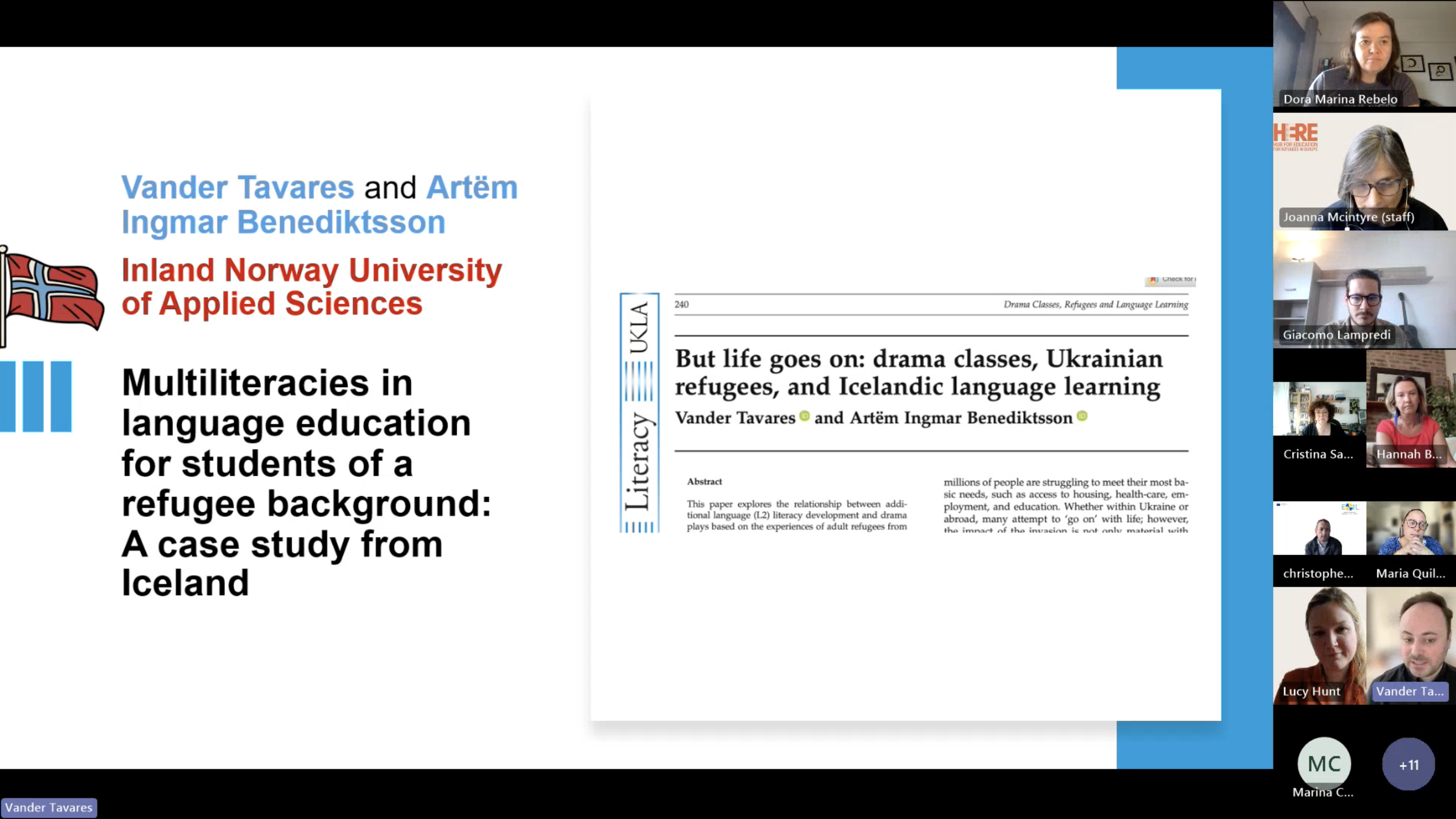On Friday 20th September 2024, the Hub for Education for Refugees in Europe (HERE) held our 8th webinar for members of the HERE Network and beyond to share information on a variety of refugee education projects from across Europe. The aim was to extend the critical conversations that were started at the Inaugural HERE Conference in 2022 and our previous networking sessions throughout 2023-24, and to provide a space for teachers, practitioners, academics, researchers and other interested parties to come together to learn, discuss and make connections.
WATCH THE RECORDING

Presentations
The online event involved six lightning presentations:
Multiliteracies in language education for students of a refugee background: a case study from Iceland
Vander Tavares and Artëm Ingmar Benediktsson (Inland Norway University of Applied Sciences)
In this presentation, Vander discussed the relationship between additional language learning and drama plays based on the experiences of adult refugees from Ukraine in Iceland. Findings from a case study suggested that learning Icelandic through drama promoted language learning in creative and engaging ways, while also fostering linguistic and cultural heritage maintenance.
Volunteering across crises
Paola Bonizzoni and Giacomo Lampredi (University of Milan)
The PRIN VOLacross research project (Volunteering Across Crises) aims to analyze the transformations that have affected the world of volunteering during and after three different global crises (the 2015 “refugee crisis,” the pandemic crisis, and the crisis related to the war in Ukraine). Through a longitudinal and comparative approach, the research seeks to examine not only how and why various crises have triggered an increase in social participation to support people in need, but also whether and to what extent these mobilizations have represented the beginning of a structural process of social innovation.
Quality of life and social inclusion of migrants and refugees through elderly care training: results from the HERO project
Matteo Finco (IRCSS INRCA)
The HERO project tried to address two problems of Western society: progressive population ageing (which determines a growing need for long-term care for older people) and the social inclusion of migrants and refugees. The project was realised in four Mediterranean countries through linguistic and care training.
Living in a different culture
Cristina Santinho (CRIA – Center for Research in Anthropology, Iscte- University Institute of Lisbon), Dora Rebelo (CIS – Center for Psychological Research and Social Intervention, Iscte- University Institute of Lisbon)
We discussed an action research project called Living in a Different Culture (LDC) which took place in a Portuguese public university in two consecutive academic years (between 2017 and 2019). Our goal was to promote and facilitate the access of refugee students to higher education, helping them to pursue previously interrupted academic careers, and to acquire tools that could support their social inclusion and autonomy. We presented some of the advantages and shortcomings of this model, as well as some recommendations for further action research projects in this field.
Challenges and resilience: Ukrainian refugee children in Estonia
Karmen Toros (Tallinn University)
This study investigates the adaptation journey of Ukrainian refugee children in Estonia, focusing on the challenges of language barriers, homesickness, and schooling. It also emphasizes the importance of psychological support and family networks, showcasing how children cope with trauma while striving to integrate into their new environment.
The EXIL project
Christophe Terrasse (EFMD)
Dr. Christophe Terrasse, Director of International Projects at EFMD, presented the EXIL project and how Higher Education Institutions can support refugee students’ integration. EXIL emerged in response to the Russian invasion of Ukraine to document existing efforts, understand these students’ needs, and provide recommendations to prevent isolation and stigmatisation.
Links to resources shared during the meeting
- HERO Erasmus project
- Results from the HERO project
- Drama classes, Ukrainian refugees and Icelandic language learning
- Benchmarking ESOL in the East Midlands
- EXIL website
- EXIL LinkedIn
- HERE Knowledge Base
- HERE Insights: including recordings and resources from previous networking sessions
- HERE Newsletters
We look forward to meeting together again within the next few months. All information on the next event will be shared via our Twitter (@hubHEREeurope) and newsletter (sign up here) – all are welcome!